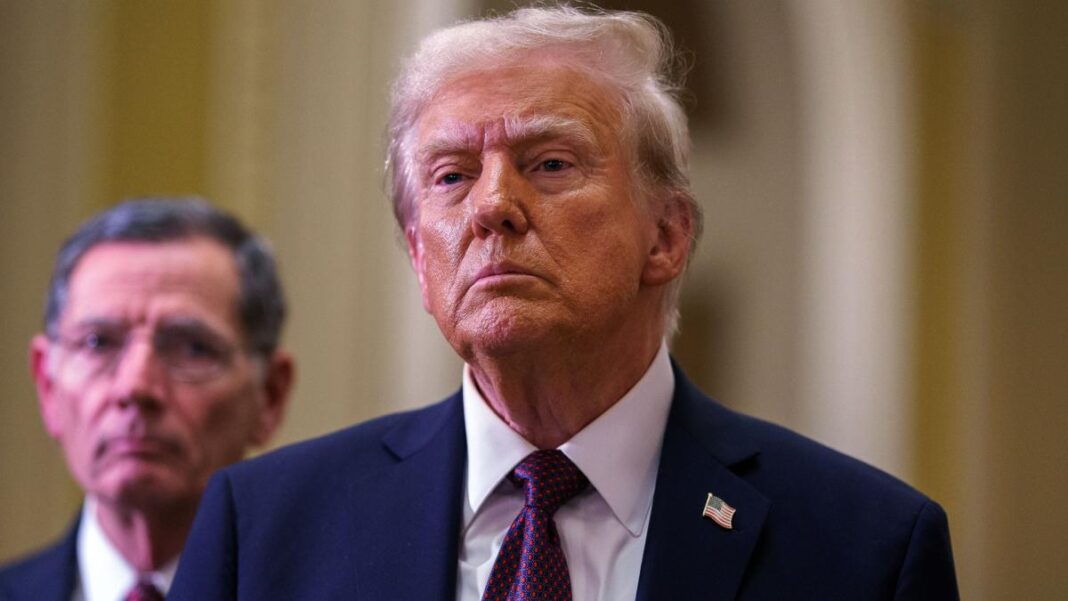The Federal Deposit Insurance Corporation (FDIC), which protects insured bank deposits, may be facing changes. According to CNN, in late 2024, then-President-elect Donald Trump’s allies were talking about potentially dismantling the FDIC and putting the U.S. Treasury in charge of deposit insurance.
Learn More: How Paychecks Would Look in Each State If Trump Dropped Federal Income Tax
Try This: 8 Common Mistakes Retirees Make With Their Social Security Checks
NPR reported that Project 2025 called for merging the FDIC and other banking regulators, and in the wake of Trump’s widespread federal employee firings, about 170 probationary FDIC workers were fired in late February. The FDIC rescinded more than 200 job offers to new examiners, and about 500 had accepted the Trump administration’s deferred resignation letter.
All of these shifts signal that other changes might be in store for the FDIC, prompting many Americans to feel unsettled about the safety of their bank accounts. If additional changes occur, knowing which actions to take can help you protect your money.
Cory Frank, certified financial advisor (CFA), co-Founder and CEO of Robora Financial, explained that the FDIC insures deposits up to $250,000 per depositor, per account category, per bank at member banks. That insurance helps protect customers in case of a bank failure, building public confidence in the banking system and reducing the chance of a bank run.
“The FDIC oversees and examines financial institutions for safety, soundness and compliance with consumer protection laws,” said Frank.
It steps in to manage the closure of failed banks, pay insured depositors and liquidate assets, minimizing disruption and cost to the financial system. Additionally, the FDIC enforces consumer protection laws and monitors economic and financial risks that could threaten the banking system.
“If any of these functions were completely eliminated, there could be a gap remaining in the financial system that could be harmful to bank customers as well as the financial system as a whole,” explained Frank.
“The most obvious negative impact would be if bank deposit insurance were completely eliminated. In this scenario, approximately $10.7 trillion in currently insured bank deposits would become uninsured, significantly increasing risks for both customers and banks.”
However, that doesn’t mean that the FDIC will necessarily be eliminated or completely changed. According to Frank, dramatically changing the FDIC would be an uphill legal battle. The insurance coverage the FDIC provides could also potentially be moved to the Treasury while still functioning properly, he added.
Read Next: Trump Wants To Eliminate Income Taxes — Here’s What That Would Mean for the Economy and Your Wallet
If the FDIC were changed or eliminated, that doesn’t mean that your money isn’t protected. According to Dennis Shirshikov, many banks use risk management strategies to further protect customer funds in addition to the insurance provided by the FDIC.
Shirshikov has extensive experience in financial risk modeling and asset protection strategies as the educational leader at Fullmind Learning and as a finance professor at the City University of New York. He explained that many banks protect customers’ money by maintaining healthy capital reserves, properly diversifying their asset portfolios and by following strict regulatory rules.
“In selecting a bank, individuals should seek out institutions marked by transparent financial practices, a robust history of stability and clear risk management policies,” he advised.
Reports of Trump’s potential changes to the FDIC generated lots of anxiety, but Shirshikov emphasized the importance of not making any rash decisions with your money.
“Relying solely on fear to make rapid decisions is not something individuals should do since it produces a cascading effect that can cause a bank run, which can then affect the financial stability of the entire system,” he said.
Instead, Shirshikov recommended that consumers watch and wait, consult with financial advisors and confirm the soundness of their bank by reviewing its public financial reports and regulatory ratings.
The Federal Financial Institutions Examination Council (FFIEC) maintains a database of regulatory ratings of financial institutions supervised by the Federal Reserve, Office of the Comptroller of the Currency, FDIC, and Office of Thrift Supervision. The ratings are updated quarterly.
According to Frank, credit unions may not necessarily be a safer location for your money. He explained that federally-insured credit unions are covered by the National Credit Union Share Insurance Fund (NCUSIF).
The NCUSIF is managed by the National Credit Union Administration (NCUA), which is a federal agency. Though the structure of credit union deposits is slightly different than bank deposits, the insurance protects credit union deposits similarly in the way it protects banks: Up to $250,000 per member, per ownership category, per credit union is insured.
“If FDIC insurance were eliminated while NCUSIF coverage remained intact, credit unions would theoretically be safer than banks,” explained Frank. “However, the likelihood of FDIC insurance being eliminated is extremely low. I also would view larger banks as safer than smaller banks, as there is greater clarity with their financial performance and balance sheet strength.”
Shirshikov echoed that sentiment, highlighting the fact that small banks can deliver great service and deep local knowledge, but large banks have diversified portfolios and are under more regulatory scrutiny. Ultimately, the safety of a small bank or credit union is determined by whether it has strong financial safeguards and management practices in place.
Frank believes there is less than a 1% chance that the federal government will reduce FDIC insurance.
“The U.S. government would be shooting themselves in the foot with the potential of causing major bank failures and loss of trust in the entire banking system if they reduce deposit insurance to zero,” he said.
There are strategic ways you can maximize the safety of your money, though. Rather than move all of your money into a bank that you feel is safe, Shirshikov suggested individuals diversify their accounts through different institutions. If you have more than $250,000 in an account, transfer some money out to a different institution so that no one account exceeds the FDIC or NCUSIF coverage limits.
“Regularly checking in on bank performance reports, staying tuned into alternative financial instruments like money market funds or short-term government securities and even implementing private deposit insurance can all be additional ways to strengthen and protect one’s financial safety net,” said Shirshikov.
Editor’s note on political coverage: GOBankingRates is nonpartisan and strives to cover all aspects of the economy objectively and present balanced reports on politically focused finance stories. You can find more coverage of this topic on GOBankingRates.com.
More From GOBankingRates
This article originally appeared on GOBankingRates.com: What To Do With Your Money If Trump Changes the FDIC




